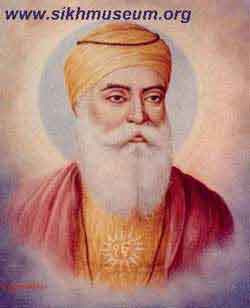![]()
"Guru Nanak taught that the way to connect with the Supreme is ... but through direct personal experience"
"Guru Nanak taught that the way to connect with the Supreme is not through the mind or through rituals, but through direct personal experience. Therefore, He emphasised meditation on the Name and Presence of God. "As fragrance abides in the flower, as reflection is within the mirror, so does your Lord abide within you. Why search for Him without?” He also made it clear that realisation of Self/God is not possible without the compassionate agency of a true guru: "The Guru is my ship to cross the world ocean. The Guru is my place of pilgrimage and sacred stream.” "Let no man in the world live in delusion. Without a Guru none can cross over to the other shore.” "
Guru Nanak
"Mysticism Of Guru Nanak"by Dewan Singh
Shri Guru Nanak Ji
Guru Nanaka was born into a Hindu family in 1439 in what is now
Pakistan. Following a transformative realisation while bathing in the
river Bein, He gave up his career as an accountant and began to
travel throughout India teaching, composing hymns and establishing
centres of worship known as dharamsalas.
He taught the absolute unity of God; everything is God, and
everything is dependent on the will of God; therefore, spirit and
matter are not ultimately antagonistic. Spirit is the only reality,
and matter is a form of spirit.
"When I saw truly, I knew that all was primeval. Nanak, the subtle
(Spirit) and the gross (material) are, in fact, identical," Guru
Nanak said. "That which is inside a person, the same is outside;
nothing else exists; by Divine prompting look upon all existence as
one and undifferentiated.”
It was a time in India's history when Mughal domination had led to
increasing tension between Hindu and Muslim. Seeing the divisiveness
of human religions, He said: "There is no Hindu or Muslim, so whose
path shall I follow? I shall follow the path of God.”
Guru Nanak taught that the way to connect with the Supreme is not
through the mind or through rituals, but through direct personal
experience. Therefore, He emphasised meditation on the Name and
Presence of God.
"As fragrance abides in the flower, as reflection is within the
mirror, so does your Lord abide within you. Why search for Him
without?”
He also made it clear that realisation of Self/God is not possible
without the compassionate agency of a true guru:
"The Guru is my ship to cross the world ocean. The Guru is my place
of pilgrimage and sacred stream.”
"Let no man in the world live in delusion. Without a Guru none can
cross over to the other shore.”
Before His death in 1539, Guru Nanaka chose one of his followers to
take responsibility for establishing the principles He had taught.
The principles were then passed down through a succession of gurus in
the Sikh religion. Sikhism was not initially intended to be a
separate religion from Hinduism or Islam but, due to a long period of
persecution, it became increasingly distinct.
The Concept Of Sahaj
"The concept of Sahaj is central and pivotal in Guru Nanak's mystical
thought. It relates to the highest spiritual state humanly attainable
and has thus deepest connotations attached to it. The ordinary
meaning of Sahaj [is] 'just what it should be' or 'just normal'. In
other words, a simple human proposition: that a man should become a
man par excellence, a real man; no adhesions, no default, no
accretions, no deviations.
But this paradoxical word Sahaj does not go with mere 'saying' or
verbal expression. It is an actuality, a real human state, a tangible
workable human achievement. Guru Nanak himself ... experienced directly
the blissful union with God and the concomitant divine manifestations
attending such beatitude.
Sahaj is originally a Sanskrit word which means 'having been born
together' and thus something inwardly perceived or intuited along
with one's birth as a human being — a sort of indwelling mystical
principle of divine perception given to man as his birthright and
therefore, a natural and effortless heritage of divinity ingrained in
humanity.
Properly speaking, Sahaj is the very mysticality of religion. It is
the acceptance of inwardness and intuitionism as the true basis of
religion, to the negation of all ritualistic externalities. Sahaj in
this meaning would be the mystical state of a man who has accepted
the divine will. Sahaj, thus, is the highest spiritual state
attainable in Sikhism. It is the highest bliss.
Sahaj connotes a natural slowness and steadiness required for perfect
action. Sahaj is the opposite of inordinate haste. Sahaj is
compactness and self-sufficiency, while haste is flippancy and inner
weakness. Sahaj would mean equipoise, equanimity and equilibrium. It
may be called 'balanced perspicacity' or sambuddhata, in the
psychological sense. All true balance and true action (which may be
called Sahaj-karam, as distinct from the self-willed action) engender
aesthetic as well as spiritual pleasure, while spiritual fulfillment
produces infinite bliss.”
Mysticism Of Guru Nanak by Dewan Singh
Disclaimer: Our material may be copied, printed and distributed by referring to this site. This site also contains copyrighted material the use of which has not always been specifically authorized by the copyright owner. We are making such material available to our readers under the education and research provisions of "fair use" in an effort to advance freedom of inquiry for a better understanding of religious, spiritual and inter-faith issues. The material on this site is distributed without profit. If you wish to use copyrighted material for purposes other than “fair use” you must request permission from the copyright owner.